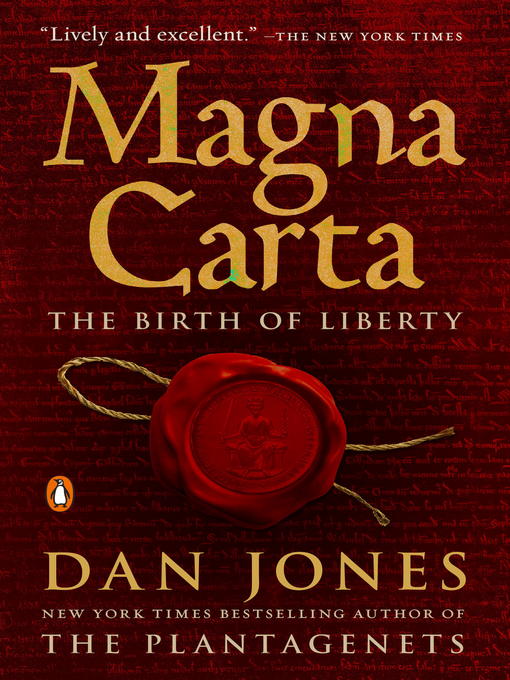
Magna Carta
The Birth of Liberty
فرمت کتاب
ebook
تاریخ انتشار
2015
Lexile Score
1370
Reading Level
11-12
نویسنده
Dan Jonesشابک
9780698186422
کتاب های مرتبط
- اطلاعات
- نقد و بررسی
- دیدگاه کاربران
نقد و بررسی

November 2, 2015
In this richly detailed history, Jones (The Plantagenets) explores the origins and rationale of the Magna Carta by looking at the cultural and social landscape of the era in which it was created. By studying the years leading up to 1215, Jones is able to show how England was changing and growing, in part due to the absentee reign of King Richard I (the Lionheart) and the subsequent excesses and unpopularity of King John. The Magna Carta, created as a peace treaty designed to rein in the king by making him answerable to his barons, was both a success and failure in its time. "Dry, technical, difficult to decipher, and constitutionally obsolete," it was supposed to "pin down a king who had been greatly vexing a small number of his wealthy and violent subjects." Instead, it survived and gained a legendary status far out of line with its original scope and intent. Jones claims that this is because of its symbolismâa cry for freedom, in opposition to tyrannyâand by showing the full context in which it became necessary, he demonstrates that the Magna Carta served its purpose well enough during a time of chaos. The writing style is accessible, if dry, and the text will serve as a useful academic resource. Agent: Georgina Capel, Georgina Capel Associates (U.K.).

September 1, 2015
At Runnymede in 1215, King John (1166-1216) signed the document that laid the foundation of our freedom. While not a myth, the reality is less glorious, writes British historian and media consultant Jones (The Wars of the Roses: The Fall of the Plantagenets and the Rise of the Tudors, 2014, etc.) in this lively, popular account of the Magna Carta's bumpy 800-year ride into immortality. While contemporary historians often go easy on him, the author's John is the villain of legend-but one who inherited a host of problems. His predecessors had strengthened England's central government and weakened the aristocracy, partly in order to better finance their wars. By John's accession to the throne, many were tired of yielding to an increasingly grasping monarchy. John quickly lost nearly all England's extensive French possessions, and his expensive efforts to regain them provoked a rebellion, mediation by the Archbishop of Canterbury, and the Magna Carta. Jones admits that the document was "something of a muddle, a collection of promises extracted in bad faith from a reluctant king, most of which concern arcane matters of thirteenth-century legal principles." Rarely does a phrase reverberate such as "King John concedes that he will arrest no man without judgment nor accept any payment for justice nor commit any unjust act." Both sides immediately resumed a civil war that ended with the monarchy's victory a year after John's death. For a century, kings reissued versions as reassuring pieces of public relations before it fell into obscurity, to be revived during the 17th-century English revolutions and in America a century later. This is politics-and-great-men history documented by medieval archives and unreliable contemporary chroniclers, but Jones has done his homework to produce an insightful, satisfying history of a beloved, if usually unread, icon of freedom.
COPYRIGHT(2015) Kirkus Reviews, ALL RIGHTS RESERVED.

Starred review from October 1, 2015
Jones (The Wars of the Roses; The Plantagenets) begins this latest book with a question: How did a document from 1215 that was never intended to be adhered to by the king who signed it become viewed as seminal in the rights of citizens? The answer is provided in this short but immeasurably informative piece that covers the reign of the infamous King John (1166-1216) after the death of his brother Richard "The Lionheart."Jones describes the decisions this untrustworthy monarch made when he put his feudal lords in such a depleted state that the only action they could take was to fight back. The writing of the "Magna Carta" is examined from the highest levels of society to the poorest fiefs scraping by to survive. Three appendixes provide an updated translation of the charter, those who enforced it, and a time line of the last 800 years. VERDICT If textbooks were this approachable, history would be a more popular subject in schools. Fans of Jones's previous works, along with those interested in the British monarchy, medieval England, the rights of citizens, and the workings of governments will find Jones's account highly beneficial. [See Prepub Alert, 4/20/15.]--Jason L. Steagall, Gateway Technical Coll. Lib., Elkhorn, WI
Copyright 2015 Library Journal, LLC Used with permission.

October 1, 2015
Jones (The Wars of the Roses; The Plantagenets) begins this latest book with a question: How did a document from 1215 that was never intended to be adhered to by the king who signed it become viewed as seminal in the rights of citizens? The answer is provided in this short but immeasurably informative piece that covers the reign of the infamous King John (1166-1216) after the death of his brother Richard "The Lionheart."Jones describes the decisions this untrustworthy monarch made when he put his feudal lords in such a depleted state that the only action they could take was to fight back. The writing of the "Magna Carta" is examined from the highest levels of society to the poorest fiefs scraping by to survive. Three appendixes provide an updated translation of the charter, those who enforced it, and a time line of the last 800 years. VERDICT If textbooks were this approachable, history would be a more popular subject in schools. Fans of Jones's previous works, along with those interested in the British monarchy, medieval England, the rights of citizens, and the workings of governments will find Jones's account highly beneficial. [See Prepub Alert, 4/20/15.]--Jason L. Steagall, Gateway Technical Coll. Lib., Elkhorn, WI
Copyright 2015 Library Journal, LLC Used with permission.

























دیدگاه کاربران